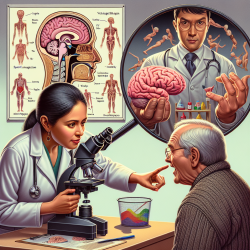Introduction
In the realm of mental health, the significance of psychiatric rehabilitation cannot be overstated. A recent study titled "Short-Term Psychiatric Rehabilitation in Major Depressive and Bipolar Disorders: Neuropsychological-Psychosocial Outcomes" offers intriguing insights into how a four-week rehabilitation program can enhance both neuropsychological performance and psychosocial functioning in individuals with Major Depressive Disorder (MDD) or Bipolar Disorder (BD). The implications of these findings are profound, especially for practitioners seeking to improve therapeutic outcomes.
Key Findings
The study involved 80 participants diagnosed with either MDD or BD. The Short-Term Psychiatric Rehabilitation Program (S-T PsyRP) was designed to enhance personal autonomy, social skills, and self-care without specific cognitive remediation training. Results indicated significant improvements in:
- Neuropsychological performance, particularly in verbal and visual memory, attention, and language fluency.
- Psychosocial functioning in areas such as involvement in ward activities, autonomy, self-care, and health management.
- Severity of clinical symptoms, although this was not directly linked to cognitive or psychosocial improvements.
Implications for Practitioners
These findings suggest that even short-term rehabilitation programs can significantly impact cognitive and psychosocial domains. For practitioners, this means:
- Incorporating short-term, structured activities that promote problem-solving and cognitive engagement can yield substantial benefits.
- Focusing on enhancing personal autonomy and social skills can improve overall psychosocial functioning.
- Understanding that symptom reduction may not directly correlate with cognitive improvements, thus emphasizing the need for holistic approaches.
Encouraging Further Research
While the study provides promising results, it also highlights the need for further research. Future studies could explore:
- The long-term sustainability of cognitive and psychosocial improvements post-rehabilitation.
- The impact of specific activities within the rehabilitation program on different cognitive domains.
- Comparative studies with control groups to isolate the effects of the rehabilitation program from other variables.
Conclusion
The study underscores the potential of short-term psychiatric rehabilitation programs in enhancing mental health outcomes. For practitioners working with children or adults with MDD or BD, integrating similar programs could be transformative. By focusing on cognitive engagement and psychosocial skills, therapists can foster significant improvements in their clients' lives.
To read the original research paper, please follow this link: Short-Term Psychiatric Rehabilitation in Major Depressive and Bipolar Disorders: Neuropsychological-Psychosocial Outcomes.










